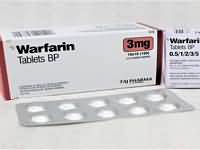CLINICAL USE
Anticoagulant
DOSE IN NORMAL RENAL FUNCTION
Depends on INR
PHARMACOKINETICS
DOSE IN RENAL IMPAIRMENT
GFR (mL/MIN)
DOSE IN PATIENTS UNDERGOING RENAL REPLACEMENT THERAPIES
IMPORTANT DRUG INTERACTIONS
Potentially hazardous interactions with other drugs There Are Many Significant Interactions With Warfarin Prescribe With Care With Regard To The Following: Anticoagulant effect enhanced by: alcohol, amiodarone, anabolic steroids, aspirin, azithromycin, aztreonam, bicalutamide, cephalosporins, chloramphenicol, cimetidine, ciprofloxacin, clarithromycin, clopidogrel, cranberry juice, danazol, danshen, dextropropoxyphene, dipyridamole, disulfiram, entacapone, erythromycin, esomeprazole, exenatide, ezetimibe, fibrates, fluconazole, flutamide, fluvastatin, glucosamine, grapefruit juice, itraconazole, ketoconazole, levamisole, levofloxacin, levothyroxine, macrolides, methylphenidate, metronidazole, miconazole, mirtazepine, nalidixic acid, neomycin, norfloxacin, NSAIDs, ofloxacin, omeprazole, pantoprazole, paracetamol, penicillins, proguanil, propafenone, rosuvastatin, saquinavir, SSRIs, simvastatin, sitaxentan, sulfinpyrazone, sulphonamides, tamoxifen, testosterone, tetracyclines, tigecycline, toremifene, tramadol, trimethoprim, valproate, venlafaxine, voriconazole Anticoagulant effect decreased by: acitretin, atorvastatin, azathioprine, barbiturates, carbamazepine, ginseng, griseofulvin, mercatopurine, mitotane, oral contraceptives, phenytoin, primidone, rifampicin, St John’s wort (avoid concomitant use), sucralfate, vitamin K Anticoagulant effects enhanced/reduced by: amprenavir, anion exchange resins, atazanavir, corticosteroids, dietary changes, nevirapine, ritonavir, tricyclics
ADMINISTRATION
Reconstition
–
Route
Oral
Rate of Administration
–
Comments
–
OTHER INFORMATION
Inactive metabolites renally excreted and may accumulate in renal impairment Reduced protein binding in renal impairment .

